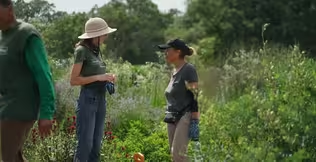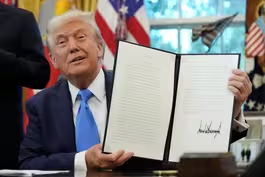
The future of DEI on college campuses as programs disappear
Clip: 9/20/2025 | 5m 39sVideo has Closed Captions
A look at the future of DEI on college campuses as hundreds of programs disappear
Change is in the air as college students return from summer break this year. At more than 400 campuses across the country, programs and centers that promote diversity, equity and inclusion have been eliminated or rebranded. Ali Rogin speaks with Paulette Granberry Russell, president of the National Association of Diversity Officers in Higher Education, for our Rethinking College series.
Problems playing video? | Closed Captioning Feedback
Problems playing video? | Closed Captioning Feedback
Major corporate funding for the PBS News Hour is provided by BDO, BNSF, Consumer Cellular, American Cruise Lines, and Raymond James. Funding for the PBS NewsHour Weekend is provided by...

The future of DEI on college campuses as programs disappear
Clip: 9/20/2025 | 5m 39sVideo has Closed Captions
Change is in the air as college students return from summer break this year. At more than 400 campuses across the country, programs and centers that promote diversity, equity and inclusion have been eliminated or rebranded. Ali Rogin speaks with Paulette Granberry Russell, president of the National Association of Diversity Officers in Higher Education, for our Rethinking College series.
Problems playing video? | Closed Captioning Feedback
How to Watch PBS News Hour
PBS News Hour is available to stream on pbs.org and the free PBS App, available on iPhone, Apple TV, Android TV, Android smartphones, Amazon Fire TV, Amazon Fire Tablet, Roku, Samsung Smart TV, and Vizio.
Providing Support for PBS.org
Learn Moreabout PBS online sponsorshipALI ROGIN: College campuses are buzzing with# activity as students return after summer break.## But change is also in the air.
At more than# 400 colleges and universities, programs and## centers that promote diversity, equity and# inclusion have been eliminated or rebranded.
DEI programs have been under a microscope# since state laws and President Trump's## executive orders labeled them as discriminatory.# So what's the future of DEI in higher education?## Paulette Granberry Russell, president and CEO of# the National Association of Diversity Officers## in Higher Education, is here to tell us more.# It's part of our Rethinking College series.
Paulette, thank you so much for joining us.# Your organization is more than 20 years old,## which seems to underscore the fact that# these efforts to promote diversity on## college campuses is not new.
But do you think# that history is reflected in the current## national conversation we're having about DEI?
PAULETTE GRANBERRY RUSSELL, President and CEO,## NADOHE: As you reference, the organization that# I helped to lead has been around for 20 years,## but that is not representative of the effort# within our colleges and universities to become## a more welcoming, supportive environment# for students based on diverse backgrounds,## identities, lived experiences.
So we've had quite a bit of work over the,## I'd say the last 60 plus years to create a more# supportive environment for all of our students.
ALI ROGIN: And some of them have told# us about the ways in which these types## of programs help them get access# to specific scholarships program## centers designed to encourage diversity.# We spoke to one student at the University## of Texas Dallas to find out what these# programs on his campus meant to him.
ALEXANDER DE JESUS, Student, University of Texas# at Dallas: When I did have access to DEI programs,## they helped me a lot in being able to# find a community where there was none.## It's very easy as a Latino to feel very# lost, especially if it's -- you're coming## from a low income background like me.
That# helped me find a lot of common community## with people who genuinely cared about what# was going on around them and also helped me## find access to conferences and programs# that I wouldn't have known otherwise.
ALI ROGIN: So what are some of those# real world changes that you're seeing## now or anticipate happening in the future now# that some of these programs are going away?
PAULETTE GRANBERRY RUSSELL: I think across# the country we've seen efforts both at the## state level and certainly more recently with# the executive orders to dismantle diversity,## equity and inclusion efforts.
We are seeing# women's centers, we're seeing centers for## members of the LGBTQ community, other cultural# spaces that are being closed or defunded.
And it's clear, I think, as represented by# the student, that these spaces were built over## decades as a direct response to student needs.# And their disappearance is deeply troubling.
ALI ROGIN: And those disappearances, do you# anticipate that those are going to lead,## or perhaps they already have# to demographic shifts as## incoming students consider# where they want to apply?
PAULETTE GRANBERRY RUSSELL: Well, it# could.
And if those individuals do## not feel that campus is either respectful# or supportive of their needs, then it is## possible that they will seek support in other# colleges and universities across the country.
But what should be noted is that these centers# are not extras to campus life.
They act as vital## resources that ensure that all students, not just# some students, are supported in their education.
ALI ROGIN: The Trump administration this# week announced a $500 million increase## in funding to historically black colleges# and universities, while at the same time## cutting funding for colleges that mainly serve# Hispanic students.
How does that change fit into## this administration's agenda when it comes# to promoting diversity on college campuses?
PAULETTE GRANBERRY RUSSELL: At its core, our# perspective is that this is not a win for## students.
It is a zero sum approach.
Funding# resources are already scarce and potentially## results in these institutions being pitted# against each other.
And all of these institutions,## whether they are HBCUs, tribal colleges,# Hispanic serving, minority serving institutions,## they play a vital role in expanding# access and opportunity for all students.
ALI ROGIN: The Trump administration has# also said that getting rid of some of these## initiatives will lead to a society of, quote,# colorblind and competence based workplaces.## How do you think about that vision as# articulated there and what does it mean to you?
PAULETTE GRANBERRY RUSSELL: Well, I think# a colorblind employment environment,## while a noble goal, that is# not the reality of individuals,## lived experiences or their sense of community.# Our communities are diverse.
People are not## necessarily uncomfortable extending themselves# across communities.
But there are times when## in fact we do not anticipate, nor should we# expect that every community is going to be## welcoming and supportive.
That is not# the country that we live in currently.
We have a long ways to go and I think to# achieve a colorblind society or country,## while noble, I don't think that's# the reality, nor do I think## somehow diminishing culture and experiences# is truly what is valued about this democracy.
ALI ROGIN: Paulette Granberry# Russell with the National## Association of Diversity Officers in# Higher Education.
Thank you so much.
PAULETTE GRANBERRY RUSSELL: And# thank you, Ali, for this opportunity.
A Detroit public garden thrives with help from volunteers
Video has Closed Captions
Clip: 9/20/2025 | 7m 29s | In Detroit, a public garden thrives with help from an army of volunteers (7m 29s)
Effect of federal funding cuts on pediatric cancer research
Video has Closed Captions
Clip: 9/20/2025 | 6m 51s | Federal funding cuts to pediatric brain cancer research ‘taking away hope’ from families (6m 51s)
News Wrap: Trump’s visa fee hike leaves companies scrambling
Video has Closed Captions
Clip: 9/20/2025 | 3m 24s | News Wrap: Trump’s $100,000 H1-B visa fee hike leaves companies scrambling (3m 24s)
Providing Support for PBS.org
Learn Moreabout PBS online sponsorship
- News and Public Affairs

FRONTLINE is investigative journalism that questions, explains and changes our world.

- News and Public Affairs

Amanpour and Company features conversations with leaders and decision makers.












Support for PBS provided by:
Major corporate funding for the PBS News Hour is provided by BDO, BNSF, Consumer Cellular, American Cruise Lines, and Raymond James. Funding for the PBS NewsHour Weekend is provided by...


